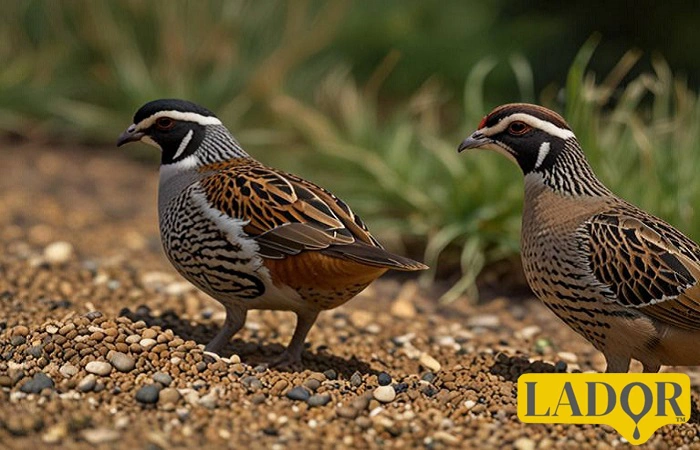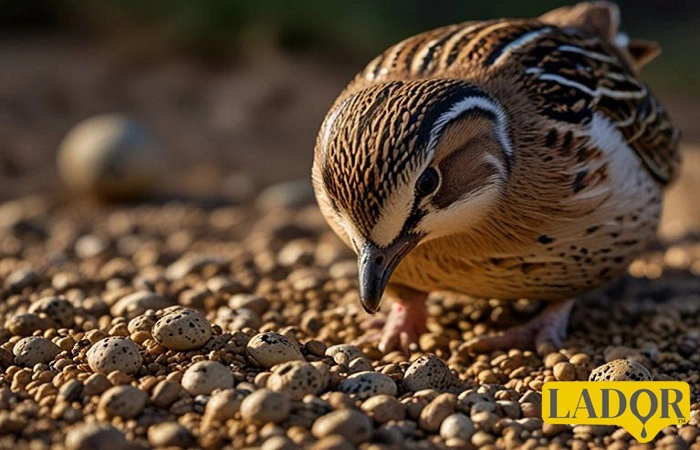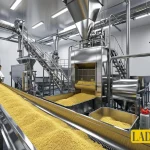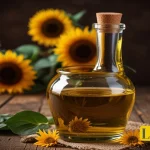Proper quail nutrition is one of the important factors in the successful breeding of this bird. Improper nutrition can lead to reduced growth, decreased egg production, increased disease, and ultimately mortality. In this article, we will fully address quail nutrition, including types of diets, required nutrients, feeding methods, and important points in this area.
Quail Feed Composition
Quail, like all birds, need a balanced diet to thrive. Their feed is a precise combination of nutrients that support growth, reproduction, and overall health. These essential nutrients include:
- Proteins: Crucial for tissue repair, muscle growth, and egg production. Common protein sources in quail feed are soybean meal, fish meal, meat meal, and dried insects.
- Carbohydrates: These provide the energy that powers quail activities. Corn, wheat, barley, and rice are typical carbohydrate sources.
- Fats: Fats offer concentrated energy and aid in the absorption of certain vitamins. Vegetable oils and animal fats are commonly used.
- Vitamins and Minerals: These micronutrients play vital roles in numerous bodily functions, including immune system health and reproductive efficiency. Oyster shell powder, brewer’s yeast, and synthetic supplements are often added to provide these essential elements.
It’s important to note that the exact nutrient composition of quail feed can vary depending on factors such as the quail’s age, breed, purpose (egg production or meat), and environmental conditions.
Quail Feed Production
The process of creating quail feed involves the following steps:
- Formulation: Nutrition experts develop specific feed formulas tailored to the unique nutritional requirements of quails at different life stages. These formulas outline the exact proportions of each nutrient.
- Grinding: Raw ingredients, such as corn, soybeans, and wheat, are finely ground to ensure that the quail can easily consume the feed. This grinding process improves digestibility and palatability.
- Mixing: All ground ingredients, along with vitamins, minerals, and other additives, are thoroughly mixed to create a homogeneous blend.
- Pelletizing (Optional): In some cases, the resulting mixture is formed into pellets of a suitable size. Pellets reduce feed waste due to their defined shape and size and are easier for quails to swallow.
- Packaging and Storage: The produced feed is packaged in suitable bags or containers and stored in a cool, dry environment.
Important Considerations in Quail Feed Production
- Ensure that all ingredients are of high quality and free from contaminants.
- The feed formula should be adjusted to meet the specific nutritional requirements of quails at different life stages.
- Implement strict quality control measures to maintain consistency in feed composition and prevent contamination.
- Seek advice from a poultry nutritionist to develop a tailored feed formula for your specific quail farming operation.
Types of Quail Feed
Quail feed is categorized based on the bird’s age and growth stage:
- Starter Feed: This is formulated for day-old chicks up to about 4 weeks of age and contains the highest levels of protein and energy to support rapid growth.
- Grower Feed: Suitable for quails that have outgrown the starter phase and are still growing. The protein content is slightly lower than the starter feed.
- Breeder Feed: Designed for adult, laying hens, this feed is formulated to meet the nutritional requirements for egg production.
- Finisher Feed: Used for quails being raised for meat production, this feed is higher in energy.
Supplemental Feeding
In addition to the main diet, supplemental feeds can be provided to enhance quail nutrition. Some common supplements include:
- Edible worms
- Sprouts
- Insects

Nutritional Needs at Different Life Stages
- Chick Stage: Chicks require a high-quality starter feed to support rapid growth. The feed should be available at all times.
- Growing Stage: Protein requirements decrease, while energy needs increase. Grower feed should be provided at specific times.
- Laying Stage: Laying hens need increased minerals like calcium, phosphorus, and vitamin D for strong eggshells. Breeder feed should be provided continuously.
- Finishing Stage: Focuses on weight gain, so high-energy, moderate-protein finisher feed is given.
Importance of Clean Water
Clean water is essential for quail health. Contaminated water can lead to diseases, reduced egg production, weight loss, and even death.
Feeding Methods
- Manual Feeding: Suitable for small-scale operations.
- Automatic Feeders: Used in commercial settings for efficient feeding.
- Waterers: Clean, fresh water should be available at all times.
Signs of Nutrient Deficiencies
- Protein deficiency: Reduced growth, feather loss, decreased egg production, general weakness.
- Energy deficiency: Weight loss, lethargy, decreased egg production.
- Calcium deficiency: Weak eggshells, soft bones.
- Vitamin D deficiency: Soft bones, decreased egg production.
- Vitamin B complex deficiency: Reduced appetite, growth retardation, neurological problems.
- Vitamin A deficiency: Skin problems, reduced vision.
The Importance of Nutrition in Quail Farming
Due to their rapid growth rate, quails have high nutritional demands. Proper nutrition supports rapid growth, egg production, and meat quality. Inadequate nutrition can weaken the immune system and make quails susceptible to diseases.
Types of Quail Feed
- Ready-made feed: Commercially available feed that contains all necessary nutrients for quails.
- Homemade feed: A feed mixture prepared at home using grains, vegetables, and other nutritious ingredients.
Quail Care Conditions
Raising quails requires specific conditions to ensure their healthy growth and egg production. Key factors include:
- Environment:
- Temperature: Ideal between 18-22°C. Extreme temperature fluctuations can cause stress and illness.
- Humidity: Should be between 50-60%. High humidity promotes mold and bacteria growth, while low humidity can dry out the respiratory tract.
- Lighting: Quails need at least 16 hours of light daily.
- Ventilation: Essential to prevent the buildup of ammonia and other harmful gases.
- Cage: The cage should be spacious, clean, and made of suitable materials.
- Water and Food: Water and food must always be clean and fresh.
- Hygiene: The environment should be cleaned and disinfected regularly.
Diseases Caused by Improper Nutrition
Malnutrition is a significant cause of diseases in quails. Deficiencies or excesses of nutrients can lead to various problems. Common diseases include:
- Growth retardation: Caused by deficiencies in protein, energy, or vitamins.
- Reduced egg production or soft-shelled eggs: Due to deficiencies in calcium, vitamin D, and other nutrients.
- Metabolic diseases: Such as rickets (soft bones) caused by imbalances in certain nutrients.
- Weakened immune system: Making quails susceptible to other diseases.
- Digestive problems: Like diarrhea, caused by fiber deficiency or contaminated food.
Signs of Illness in Quails
- Decreased appetite and weight loss
- Ruffled and dull feathers
- Lethargy and reduced activity
- Diarrhea
- Difficulty breathing
- Swelling of legs and abdomen
- Changes in droppings color
Consequences of Improper Nutrition
- Stunted growth
- Decreased egg production
- Disease
- Reduced meat quality
Preventing Diseases Caused by Malnutrition
- Ensure the feed meets all the nutritional requirements of quails.
- Always provide fresh, clean water.
- Keep the environment clean and sanitized.
- Regularly check the health of your quails.

Key Points in Quail Nutrition
- Balanced diet: Quail feed should provide all necessary nutrients.
- Clean water and feed: Water and feed should always be fresh and clean.
- Regular feeding: Feed quails at specific times.
- Gradual diet change: When changing the feed, do so gradually to allow the quail’s digestive system to adjust.
- Maintain hygiene: Keep the quail’s environment clean and sanitary.
- Age-appropriate feed: Feed formulations should vary based on the quail’s age. Chicks require more protein, while adult quails need more calcium for egg production.
- Supplements: Consider using vitamin and mineral supplements to meet additional nutritional needs.
- Consult a veterinarian: Consult with an avian veterinarian for advice on the best feed and feeding amounts.
Conclusion
Quail feed plays a critical role in the growth, health, and reproduction of these birds. Providing high-quality feed that meets the specific needs of quails is essential for successful quail farming.
Ala Sepahan Oil has many years of experience in producing all kinds of powders, oils and raw materials for livestock and poultry feed, such as; Native chicken feed, colored chicken feed, duck feed, palm fat powder, calcium plus powder, tallow fatty acid, hydrogenated soybean oil and countless other products are ready to serve you dear ones. For price inquiry and consultation, contact our experts at Ladorfat Company.



